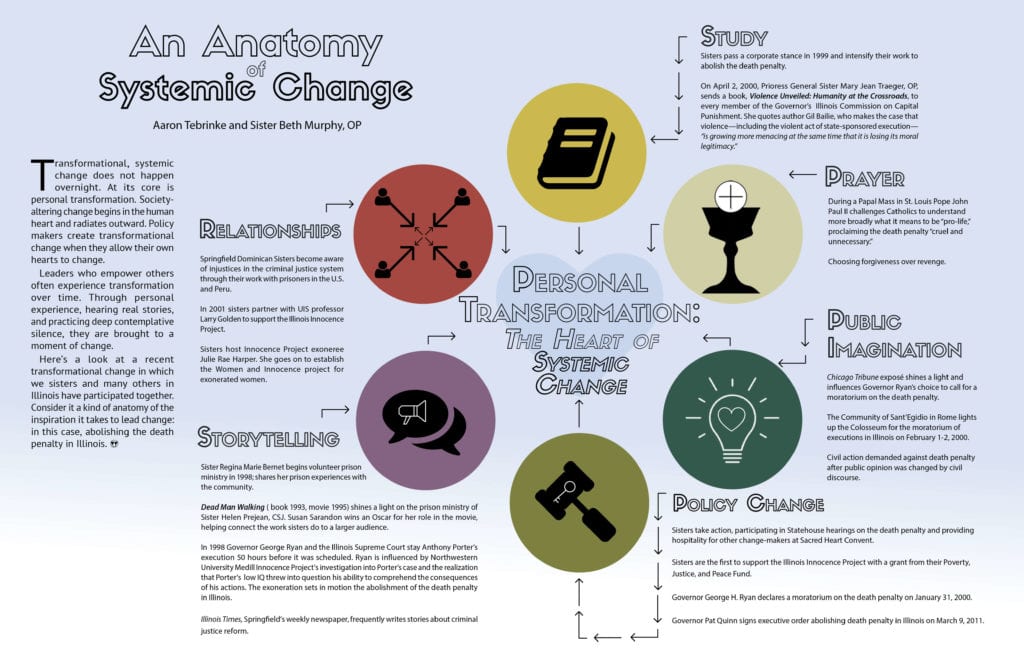Personal
Transformation:
The Heart of
Systemic
Change
Transformational, systemic change does not happen overnight. At its core is personal transformation. Society-altering change begins in the human heart and radiates outward. Policy makers create transformational change when they allow their own hearts to change.
Leaders who empower others often experience transformation over time. Through personal experience, hearing real stories, and practicing deep contemplative silence, they are brought to a moment of change.
Here’s a look at a recent transformational change in which we sisters and many others in Illinois have participated together. Consider it a kind of anatomy of the inspiration it takes to lead change: in this case, abolishing the death penalty in Illinois.
Relationships
Springfield Dominican Sisters become aware of injustices in the criminal justice system through their work with prisoners in the U.S. and Peru.
In 2001 sisters partner with UIS professor Larry Golden to support the Illinois Innocence Project.
Sisters host Innocence Project exoneree Julie Rae Harper. She goes on to establish the Women and Innocence project for exonerated women.
Storytelling
Sister Regina Marie Bernet begins volunteer prison ministry in 1998; shares her prison experiences with the community.
Dead Man Walking ( book 1993, movie 1995) shines a light on the prison ministry of Sister Helen Prejean, CSJ. Susan Sarandon wins an Oscar for her role in the movie, helping connect the work sisters do to a larger audience.
In 1998 Governor George Ryan and the Illinois Supreme Court stay Anthony Porter’s execution 50 hours before it was scheduled. Ryan is influenced by Northwestern University Medill Innocence Project’s investigation into Porter’s case and the realization that Porter’s low IQ threw into question his ability to comprehend the consequences of his actions. The exoneration sets in motion the abolishment of the death penalty in Illinois.
Illinois Times, Springfield’s weekly newspaper, frequently writes stories about criminal justice reform.
Study
Sisters pass a corporate stance in 1999 and intensify their work to abolish the death penalty.
On April 2, 2000, Prioress General Sister Mary Jean Traeger, OP, sends a book, Violence Unveiled: Humanity at the Crossroads, to every member of the Governor’s Illinois Commission on Capital Punishment. She quotes author Gil Bailie, who makes the case that violence—including the violent act of state-sponsored execution—“is growing more menacing at the same time that it is losing its moral legitimacy.”
Prayer
During a Papal Mass in St. Louis Pope John Paul II challenges Catholics to understand more broadly what it means to be “pro-life,” proclaiming the death penalty “cruel and unnecessary.”
Choosing forgiveness over revenge.
Public Imagination
Chicago Tribune exposé shines a light and influences Governor Ryan’s choice to call for a moratorium on the death penalty.
The Community of Sant’Egidio in Rome lights up the Colosseum for the moratorium of executions in Illinois on February 1-2, 2000.
Civil action demanded against death penalty after public opinion was changed by civil discourse.
An Anatomy of Systemic Change originally was published in the fall 2016 JUST Words, Volume 16 Number 3.



It’s amazing to me as I re-read the names various persons and the steps each one contributed to this transformative change. It is a powerful demonstration of what can be done when people collaborate for the sake of justice. Thanks for your unnamed yet powerful part in this endeavor, Beth.